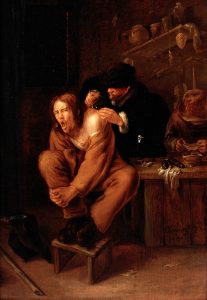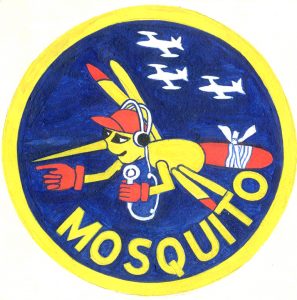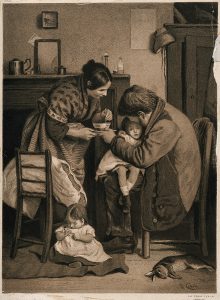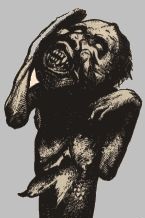Our work at the Centre for Health Humanities coalesces around four interrelated themes:
Bodies, Minds, Sickness

Credit: Wellcome Collection / CC BY
At the heart of this theme is an interest in what it is like to be unwell. Colleagues approach this question from diverse disciplinary perspectives – History, Art History, English Literature, Philosophy, Modern Languages, Pharmacy, Psychology, and Applied Linguistics – but what they have in common is the belief that experiences of the body and mind are not universal and unchanging, but contingent on time, place, culture, and even individual personality.
Key issues addressed by these academics include: perceptions of pain; bodily sensations and the senses; definitions of health and illness; the relationship between disease, disability, and disfigurement; body-mind relationship; emotional and physical suffering; witnessing others’ pain; patient agency over treatment; experiences of pharmaceutical or surgical intervention; locations of medical care; and compassion and listening. Ultimately, these academics hope that their diverse views on experiences of illness, disability, and treatment will prove helpful to people who are facing these challenges today.
Colonial and Global Medicine
We are interested in examining how medicine has been entangled with world historical problems, such as slavery, colonialism and globalisation.

Intercultural encounters in the postcolonial world enriched Anglo-American and West European notions of health, disease and cure. Inhabitants of the (erstwhile) European and American colonies rejected, reconceptualised, and appropriated these notions. Indigenous therapies in these regions in turn were transformed beyond recognition. Researching these global and colonial histories enables us to nuance Eurocentric conceptions of medicine, and to contribute to debates about the decolonisation of health. Lessons learnt from the past are invaluable in making current global health strategies humane, respectful and effective.
Life Transitions

Credit: Wellcome Collection / CC BY
This theme investigates the variety of human experiences and transitional identities that we occupy throughout life. Common themes include the changing identities of women over the life cycle, such as those brought about by marriage, pregnancy, physical impairment, or dependant/dependency; concepts of ‘adolescence’, and the impact of physical changes at puberty, migration and work, and social inclusion or exclusion; individual and collective reactions to bereavement and death, and forms of religious, magical, and medical healing; and senescence, exploring attitudes to, and experiences of, older or infirm people in the medieval and post-medieval worlds, and how past perceptions have coloured contemporary ones. Taking an interdisciplinary approach, our work is historical, anthropological (for example, bereavement and care in Senegal), and archaeological (palaeopathology and objects). It also draws on broader issues, such as medical treatment, magic, meteorology, and biological criminality.
Monsters and the Monstrous

Public Domain
Monsters matter in medicine: Francis Bacon recommended the study of the strange as a route to reveal the laws of nature, and modern geneticists study mutations in order to understand DNA. Monsters have served a similar function in culture, providing the ‘other’ against which groups and societies define themselves. The original understanding of the word, derived from the Latin monere, ‘to warn or advise,’ framed monsters as portents, signs sent by God. Today, monsters form a long-established literary trope, stretching from Mary Shelley’s Frankenstein to Stan Lee’s X-Men, that uses the ‘other’ to comment on contemporary society and warn us about the future. The theme explores the vital question, who makes monsters, and why? Key contexts include pregnancy and childbirth, interventions (magical and medical), inheritance, otherness, and the boundaries between human and non-human monsters. In the process, our research spans a range of areas, from twelfth century leprosy through to the growth of AI.
